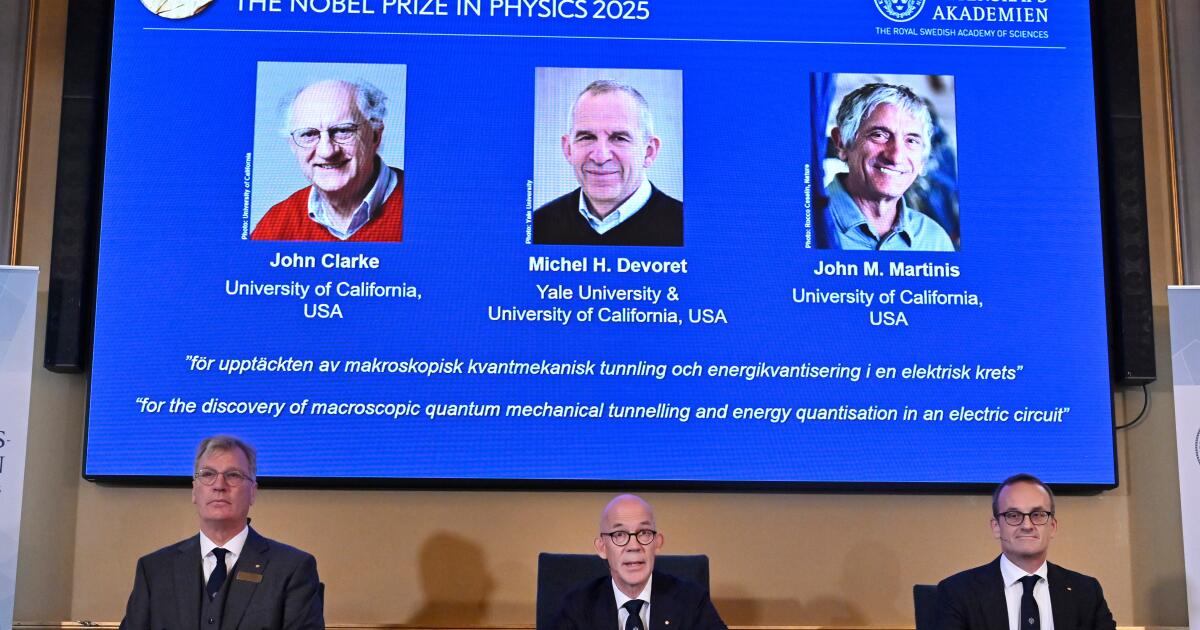Three scientists from the University of California, along with a researcher from Yale, were awarded the Nobel Prize in Physics on October 3, 2025, for their groundbreaking work in quantum mechanics. John Clarke, Michel H. Devoret, and John M. Martinis were recognized for their research into quantum tunneling, which has significant implications for enhancing digital communications and computing technologies.
Clarke, who conducted much of his research at the University of California, Berkeley, expressed his astonishment at receiving the award. “It had never occurred to me, ever, that I would win the Nobel Prize,” he said, reflecting on the surprise that came with the announcement. Martinis, based at the University of California, Santa Barbara, was still asleep when the news broke, according to his wife, Jean. Devoret, who is affiliated with both Yale and the University of California, Santa Barbara, could not be reached immediately for comment.
Significance of the Research
The award-winning research dates back to the mid-1980s and focuses on the “weirdness of quantum mechanics.” This field explores how subatomic particles behave in ways that defy conventional understanding, such as existing in multiple states simultaneously. Jonathan Bagger, CEO of the American Physical Society, highlighted how the findings translate into real-world applications, specifically in the realm of quantum computing and communications.
Mark Pearce, a professor of astrophysics and member of the Nobel Physics Committee, emphasized the potential uses of this research, noting that it could lead to advancements in quantum sensors and cryptography. These technologies are crucial for sensitive measurements and secure communications, respectively. “Quantum computers are one obvious application, but the implications extend far beyond that,” Pearce explained.
The impact of their work is evident in various technologies we use today. Bagger mentioned that while our everyday cellphones may not directly derive from this specific breakthrough, the advancements in quantum mechanics play a vital role in enhancing devices like magnetic resonance imaging (MRIs), making them more effective.
Reactions and Future Implications
Clarke’s response to the Nobel announcement was one of surprise and gratitude, stating that the recognition was “the surprise of my life.” He was inundated with congratulatory messages following the call from his daughter, indicating the significance of the award in the scientific community. The Nobel Prize carries a cash award of 11 million Swedish kronor (approximately $1.2 million) along with immense prestige.
The 2025 Nobel Prize in Physics marks the 119th occasion the award has been given. Last year, the prize recognized contributions in artificial intelligence, awarded to John Hopfield and Geoffrey Hinton. The Nobel announcements continue with prizes in chemistry, literature, and peace set to be revealed later in the week.
Olle Eriksson, Chair of the Nobel Committee for Physics, remarked on the enduring influence of quantum mechanics in our daily lives, stating, “It is wonderful to celebrate the way that century-old quantum mechanics continually offers new surprises.” This research not only enhances our understanding of the fundamental nature of the universe but also paves the way for innovations that could reshape technology as we know it.
As researchers continue to explore the implications of quantum mechanics, the work of Clarke, Devoret, and Martinis serves as a crucial foundation for future advancements in computing and communication technologies, reinforcing the importance of scientific inquiry in driving progress.
